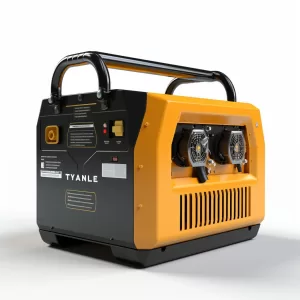
Inverter Generators Unveiled: What You Need to Know
January 25 2024 
Inquiry
Global electronic component supplier AMPHEO PTY LTD: Rich inventory for one-stop shopping. Inquire easily, and receive fast, customized solutions and quotes.
QUICK RFQ
ADD TO RFQ LIST
In this blog, we will explore the inner workings of inverter generators, and address common questions such as "what are inverter generators," "how does an inverter generator work," "are inverter generators better," and so on.
What are Inverter Generators?

What does an Inverter Generators do?
Converts Power:- Alternating current (AC) power with varying voltage and frequency is produced by an alternator in conventional generators. Sensitive gadgets may be harmed by this.
- An inverter generator goes one step further and makes use of an alternator that is comparable. After converting the AC electricity to direct current (DC), it reverts it to AC with a steady voltage and frequency by using an inverter. The functioning of the electricity grid is comparable to this.
- An inverter generator provides a steady voltage and frequency, which makes it perfect for powering delicate devices like phones, computers, and medical equipment. By doing this, the chance of voltage dips or spikes damaging these devices is eliminated.
- Furthermore, the electricity produced by inverter generators is typically cleaner and has fewer harmonics, which can interfere with other devices and radio transmissions.
- Due to their ability to modify engine speed in response to power demands, inverter generators frequently have higher fuel efficiency than conventional generators. For smaller loads, this translates to reduced fuel use and quieter operation.
- Additional features like eco-mode for even higher fuel efficiency and parallel operation, which lets you connect two generators for increased power, are frequently included.
Video related to Inverter Generators
How does an Inverter Generator Work?
Step 1: Fuel Combustion:- The internal combustion engine must churn for the process to begin, just like with any gasoline engine. When fuel ignites, it pushes pistons and produces mechanical energy that turns the crankshaft.
- Alternators are machinery that changes mechanical energy into electrical energy, and they are connected to the crankshaft. Alternating current (AC) electricity is generated inside the alternator by rotating magnets inducing a current in stationary coils.
- Inverter generators use an extra step, in contrast to the varying AC generated by conventional generators. Direct current (DC) is produced when the raw AC electricity enters a rectifier circuit. By doing this, the undesired fluctuations in voltage and frequency are eliminated.
- The inverter generator's core, the inverter circuit, is the next component to receive the DC electricity. Any leftover waves in the DC are smoothed out by this intricate circuitry, which serves as a power regulator.
- The DC is then converted back into AC by the inverter, producing an accurately regulated AC output with a steady voltage and frequency (often 120V/60Hz in North America). When it comes to delicate devices, this "clean" AC is safe and dependable since it matches the quality of the electrical grid.
- After the AC power has stabilized, it passes through the control panel, which is equipped with functions including eco-mode, overload protection, and voltage adjustment. Eventually, your devices are powered by the electricity that is now ready to use and feeds into the generator's outlets.
Are Inverter Generators Waterproof?
It is noteworthy that the majority of inverter generators are not completely waterproof, even though some of them may have components and enclosures that are resistant to weather. For safety reasons and to avoid damage, you must keep your inverter generator out of the rain, snow, or standing water. Consider getting an enclosure or cover specifically designed to protect your inverter generator from the weather if you plan to use it outside or in damp situations.Applications of Inverter Generators
- Camping and Outdoor Recreation: Because of their silent operation, portability, and capacity to power delicate electrical devices, inverter generators are well-liked by campers and outdoor lovers. Electronic devices, electric grills, portable fridges, and camping lights can all be powered dependably by them.
- Boats and RVs: Inverter generators can power boats and RVs, offering a dependable supply of electricity for air conditioners, appliances, and other aboard equipment.
- Emergency Backup Power: These generators are useful for supplying backup power during blackouts, particularly for medical equipment, vital home appliances, and delicate technological equipment.
- Construction and Job Sites: Inverter generators provide a dependable and portable power source for tools, lighting, and other equipment at construction and job sites.
- Remote Work and Telecommuting: Inverter generators can offer a dependable power supply for setups involving remote work, guaranteeing the continuous operation of computers, modems, and other necessary equipment.
- Off-Grid Living and Remote Locations: Inverter generators offer a dependable and transportable energy option that is appropriate for off-grid living, rural cottages, and places without access to conventional power sources.
Comparing Inverter Generators to Conventional Generators
Noise Level:- Inverter Generators: Quiet operation is a well-known feature of inverter generators. There is less noise when the engine speed may be changed according to the load.
- Conventional Generators: Because of their steady engine speed, conventional generators may create more noise, which makes them unsuitable for environments where noise is a concern.
- Inverter Generators: A lot of inverter generators are lightweight and portable, which makes storing and moving them simple.
- Conventional Generators: Conventional generators are less portable and more difficult to transport from one place to another because they are sometimes bigger and heavier.
- Inverter Generators: Known for their low total harmonic distortion (THD) and clean, consistent power output, inverter generators are safe for use with delicate electronic equipment.
- Conventional Generators: Appliances and electronics that are susceptible to high THD levels may be harmed by conventional generator electricity.
- Inverter Generators: These generators are engineered to modify their speed in response to fluctuations in electrical demand. This feature leads to increased fuel economy and longer fuel tank life.
- Conventional Generators: When the electrical load is low, conventional generators usually run at a steady speed, which results in increased fuel consumption.
- Inverter Generators: Users who require more power than a single unit can supply might have flexibility by connecting some inverter generators in parallel to boost power output.
- Conventional Generators: The scalability of power production is limited by the less frequent use of parallel operation in conventional generators.
- Inverter Generators: Due to their fuel economy and capacity to modify engine speed in response to demand, inverter generators emit fewer emissions into the atmosphere.
- Conventional Generators: Because of their steady engine speed and possibly less efficient operation, conventional generators may emit more pollutants.
Are Inverter Generators Better?
Compared to traditional generators, inverter generators provide several benefits. While their fuel efficiency and quiet operation make them suitable for recreational and household usage, their ability to deliver clean and reliable power makes them well-suited for delicate equipment. Furthermore, parallel capability is a characteristic that many inverter generators have, enabling users to connect two units for higher power output when required. However, because of their stronger construction and higher power output, traditional generators can still be chosen for heavy-duty industrial applications.Conclusion
In conclusion, inverter generators provide a cutting-edge and effective portable power-producing option. They are a popular option for both residential and recreational use because of their quiet operation, fuel efficiency, and capacity to generate clean, consistent electricity. Although inverter generators might be partially waterproof, they have some advantages that meet the needs of small company owners, homes, and outdoor lovers. Choose the power production solution that best meets your needs if you are aware of the benefits and inner workings of inverter generators.Related Articles
- ·Stratix 10 VS Stratix V: Which FPGA is Right for Your Next Project?
- ·Intel Xeon Platinum 8454H vs AMD EPYC: Which Reigns Supreme?
- ·A Deep Dive into the AMD EPYC 4564P Processor
- ·MSP430F5438A vs MSP430F5529: A Detailed Analysis of Their Capabilities
- ·Comparing MSP430F6659 and MSP430F5419A: Which One is Right for Your Project?
- ·Exploring the Features of MSP430F5529 and MSP430F5638 Microcontrollers
- ·Demystifying 20 Microcontroller Projects for Beginners
- ·Unveiling the Ultimate Guide to Microcontroller Programming
- ·4680 Battery: Unveiling the Power Potential of the Next-Gen Cell
- ·Exploring the Case Studies on Arduino Applications
Populer Posts
